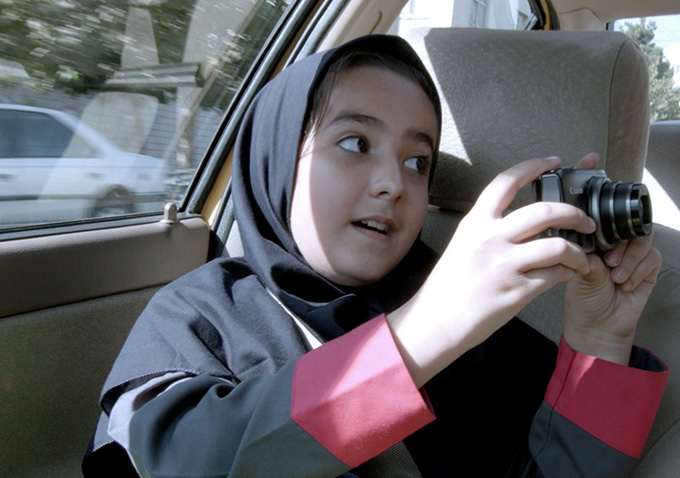 This is a reprint of our review from the 2015 Berlin Film Festival.
This is a reprint of our review from the 2015 Berlin Film Festival.
The deplorable mistreatment of multi-award-winning Iranian New Wave director Jafar Panahi in his native country (he was arrested in 2010 and now labors under a 20-year ban from filmmaking, on pain of a prison sentence) is the irreducible fact that hangs over his recent films, "This Is Not A Film" and "Closed Curtain." And it means that when we approach a new Panahi film these days, made with bravery, often in secrecy, and in direct opposition to the Iranian authorities, it tends to be with furrowed brow, and a portentous sense of the Political Importance of what we’re about to watch. But almost from the off in his new film, "Taxi," Panahi himself slyly cracks a window on all that gravity: it’s reflexive, intelligent, and provocative, to be sure, and has lots to say about Iranian society in general and the fine art of dissidence in particular, but it’s also sort of a blast. It is rightly felt that if Panahi can muster the resources to get a film made under such insupportable circumstances, it is all but our duty to watch it as our own small act of solidarity and resistance. With "Taxi," Panahi makes that duty a pleasure.

Thwarting the ban this time by filming entirely in the confines of the titular vehicle (recalling fellow Iranian New Waver Abbas Kiarostami‘s "Ten" and "Taste of Cherry"), Panahi also appears onscreen as the driver of the cab. Initially it seems this could be docu-realism, as from a dashboard camera we see the bustling streets of downtown Tehran, and watch with a traveller’s interest as we wait at a busy junction. But crossing the junction, Panahi’s cab is hailed, and fiction enters the frame in the shape of a man, and then a woman, strangers to one another, who engage in a heated conversation about morality for the short distance of their shared taxi ride. It’s an argument cued up by the man’s offhand remark about hoping to see the men who stole the wheels off a friend’s car hang, and thus some of the film’s primary themes are introduced: crime and punishment, justice and fairness in an Iranian society living under Sharia law.
READ MORE: Watch: Take A Ride In New Trailer For Jafar Panahi’s ‘Taxi’
But that’s by no means all Panahi has up his sleeve. The very next customer recognizes him, and draws the meta nature of the project out. As it transpires, he’s not simply an excited fan, but a pirate movie bootlegger (who supplied the filmmaker previously with films such as "Once Upon a Time in Anatolia" and "Midnight in Paris"). Subsequent passengers too, with the little dramas they bring into the cab, highlight the various roles that filmmaking can play — as testimony, as evidence, as propaganda, and, closest to home, as act of resistance.

"Taxi" is constrained — of course it is. The dashboard-cam conceit is restrictive, imposing similar formal limitations to those of a found footage film. And there are cuts, to shaky handheld phone or camera images, but also to Panahi’s reactions that are out of step with how strictly he observes the "rules" elsewhere. Narratively too, the condensing of all this action and life and drama (and the film teems with it) into 82 minutes of more-or-less "real time" leads to a few on-the-nose scenarios. Like Panahi’s onscreen niece consulting him about a school project that involves her shooting her own "distributable" film — in other words, one that adheres to the very rules that Panahi himself was deemed to have violated back in 2010. But there is too much energy and wit here for things to ever get heavy-handed, even during the more serious segments, and in the not-so-serious ones you have lovely oddball things happen, like the two ladies carrying goldfish in a bowl (a nod to Panahi’s debut "The White Balloon" perhaps?), which they believe they must return to a certain spring by noon or due to some mystical superstition, they will die.
The vignetted glimpses we get into the spectrum of street-level Iranian life, in all its diversity and chaos, serve to remind us that Tehran is not just a place in the news, it is a city filled, like all cities, with all the good and bad energies of humanity. Good energy comes via one of the last passengers — a female lawyer with an armful of roses and a canny understanding of Panahi’s situation. As she gets out of the cab, she places one of her roses on the dashboard in front of the camera, dedicating it to us, the viewers, "the people of cinema, who can be relied on."

That rose made me think of Beckett and how, at the end of "Waiting for Godot" the tree has grown leaves. Panahi’s film, like Beckett’s play, is absurd and circular and builds to a finale that ironically suggests its own futility. But the rose suddenly there on the previously empty dashboard reminds us, like the leaves on formerly barren branches, that where once there was nothing there is now something, and where there is life, there is art, and there is hope. Where once there was only Panahi’s ban and his absence, there is now a third film, an insightful, enjoyable, absorbing ride that stands as a testament to its director’s lively, ungovernable storytelling imagination. Just think what he could do if he were free. [B+]

